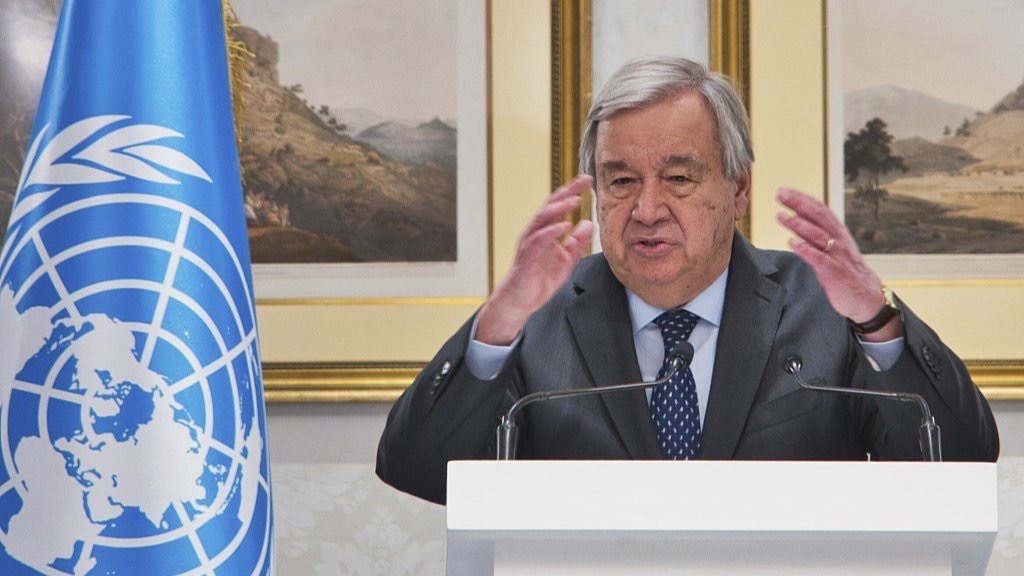Qatar had paved the way for dialogue when it first opened the Taliban’s office on its lands in 2013 at the request of the U.S.
The interim government of Afghanistan Taliban has set unacceptable conditions for attending a United Nations-led two-day meeting on Afghanistan in Qatar, UN Secretary-General Antonio Guterres said.
Guterres rejected the idea that the UN had failed to bring Afghanistan’s de facto rulers to the table because of ineffective communication and said “I received a letter [from the Taliban] with a set of conditions to be present in this meeting that were not acceptable.”
“These conditions denied us the right to talk to other representatives of Afghan society and demanded a treatment that would, to a large extent, be similar to recognition,” the UN chief said during a media stakeout on Monday.
The Taliban, who returned to rule Afghanistan in 2021, refused to attend, citing their participation was “unbeneficial” if the UN did not recognise them as the sole representatives of Afghanistan.
Nevertheless, Rosemary di Carlo, the UN undersecretary-general for political and peace-building affairs, held an individual meeting with a representative from the Taliban, affiliated with the group’s political office in Doha.
The two-day meeting, which concluded on Monday in the Qatari capital, aimed to bring together member states and international envoys to address various issues confronting Afghanistan.
The Taliban’s absence loomed large as their demands remained unmet.
The Taliban’s takeover of Kabul in August 2021, following the chaotic withdrawal of the United States and NATO forces, has left the country in a precarious situation.
Despite holding control, no nation recognises the Taliban as Afghanistan’s legitimate government. The UN has cited the persistent bans on female education and employment as major impediments to its recognition.
Since its takeover, the acting Afghan government imposed restricting policies on women and girls, despite initially promising a more open rule when they assumed power.
Females have since been unable to work or receive education, sparking major concern among the international community and rights organisations. The Taliban have barred girls from getting an education beyond the sixth grade and forbid women from going to universities and working in most professions.
Defending their actions, the Taliban insists that these measures are domestic affairs and rejects criticism as unwarranted interference. Guterres, however, stressed the need to lift these restrictions, asserting their essential nature.
The meeting of special envoys for Afghanistan from 25 countries as well as Afghan civil society members, including women, and representatives of the Organization of Islamic Cooperation, the European Union, and the Shanghai Cooperation Organization was productive according to the UN official.
Guterres said he will initiate consultations around appointing a UN envoy to coordinate engagements between the interim Taliban administration and the international community.
Regarding the appointment of a UN special envoy, another bone of contention with the Taliban, Guterres called for “clear consultations” to clarify the envoy’s role. He emphasised the importance of making the role “attractive” from the Taliban’s perspective.
He went on to highlight the necessity of overcoming the deadlock by creating a roadmap that addresses both the concerns of the international community and those of the Taliban.
The Doha meeting also explored the possibility of a “contact group” for a more coordinated response to the Afghan file. Guterres proposed the involvement of a limited number of states, including permanent members of the UN Security Council, neighbouring countries, and relevant donors.
However, he said, “I believe it would be a way to have coherence in the way the international community is engaging with the de facto authorities of Afghanistan”.
Qatar’s role
Qatar, which has served as a diplomatic bridge between the U.S. and the Taliban over the past decade, hosted a rare direct meeting between Washington and the Taliban in July 2023, where the former expressed its openness to technical dialogue with the acting Afghan government.
Qatar had paved the way for dialogue when it first opened the Taliban’s office on its lands in 2013 at the request of the U.S.
When the Taliban took over Kabul, Doha played a pivotal role by evacuating more than 100,000 Afghans and foreigners from the country. The mass evacuations have been described as history’s largest airlift of people.
Aside from hosting meetings between the Taliban and the West, Qatar, among other Muslim countries, has repeatedly expressed concern over the interim government’s decisions regarding women and girls.
In January 2023, Qatar’s current prime minister Sheikh Mohammed bin Abdulrahman Al Thani said he spoke to the Taliban to understand the rationale behind the restrictive policies towards Afghan women and girls.
“It’s more and more provoking and making the situation much worse for them and for the Afghan people; we’ve been trying to reach out recently after these decisions [were taken]. We’ve [also] been trying through other means jointly with other Muslim countries to talk to them,” Sheikh Mohammed said at the time.
The Taliban have tightened restrictions on the daily lives of all females over the past two years under a governance approach reminiscent of their former rule between the 1990s and 2001.







